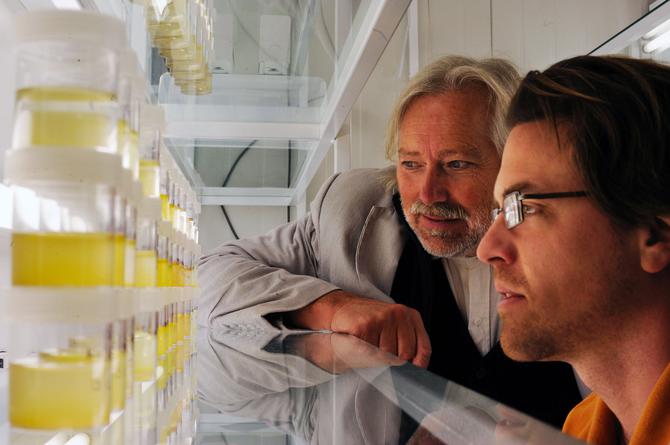The University of Tasmania has secured $9 million for projects ranging from using DNA to develop an Australian plankton record stretching back 1000 years, to using satellites to map remote vegetation and provide early warnings of droughts, diseases and pests.
This funding was won in the latest round of the Australian Research Council’s major grants program, announced today by the Federal Education and Training Minister Senator Simon Birmingham.
University Vice-Chancellor Professor Peter Rathjen said the projects would add to the globally impactful research currently underway in Tasmania.
“The work that our academics do here in Tasmania answers questions, and poses new ones, that are crucial to Australia and the international community,” Professor Rathjen said.
Securing funds from the Australian Research Council is a competitive process and our success confirms our place as a cutting edge research-led institution.
Fifteen University of Tasmania projects were funded across three grant schemes, totalling over $6.8 million. The grants bring with them additional block funding, which takes the total value to the University and the State to just over $9 million.
Deputy Vice-Chancellor (Research) Professor Brigid Heywood said the projects highlighted the University’s research strengths, particularly in the Environment, Resources and Sustainability, and the Marine, Antarctic and Maritime themes.
This is a small snapshot of the work that our academics are driving, and the investment in research and innovation that work brings to Tasmania, Professor Heywood said.
“The challenges we face as a global community are deeply complex; with these projects, and many others, Tasmania will continue to play a key role in building a successful future.”

Professor Gustaaf Hallegraeff (left) will embark on a project to create a record of Australian plankton spanning 50-1000 years, using DNA technology.
Some of the projects funded
include:
Professor Gustaaf Hallegraeff leading a project to assemble a long term Australian plankton record spanning 50 to 1000 years by using DNA technology to examiner sediment depth cores. Long-term records are essential to understand how disruptive algal and jellyfish blooms, introduced species and increased human use of coastal resources affect dynamic plankton ecosystems.
Dr Zbynek Malenovsky will develop algorithms to map vegetation stress indicators from space-borne missions’ optical observations of Earth, paving the way for regular satellite monitoring of plant health in extensive and inaccessible Australian and Antarctic areas. More accurate and timely remote sensing maps of early stress symptoms will provide early warnings of droughts, diseases and pests, tell when and where to protect ecological functions of wild natural systems, and help to sustain or even increase agricultural food production.
Dr Kate Booth will analyse house and contents insurance to advance strategic disaster management. By understanding the geographies of under-insurance, the aim is to improve disaster policy and practice, and reduce the financial and social costs of disasters to governments, communities and householders.
Associate Professor Menna Jones will lead a project testing how suppressing invasive prey – rabbits – could reduce the effect of invasive predators – cats – on native wildlife. Effective control of cats is difficult at large-scales but rabbit control is feasible. The aim is to provide a conceptual approach that could be scaled up at large scales in unfenced landscapes around the world.

Associate Professor Menna Jones will lead a project testing how suppressing invasive prey – rabbits – could reduce the effect of invasive predators – cats – on native wildlife.
Other projects, funded through the ARC’s Discovery Project, Future Fellowship and Discovery Early Career Research Award schemes, seek to understand more about brain circuitry and neuroplasticity, the evolution of defence mechanisms against diseases in nature, the workings of the Antarctic Circumpolar Current, the effects of climate change, human society and herbivores on marine ecosystems, the true impact of Antarctica on sea level rise, and more.
The ARC Major Grants round follows the announcement earlier this year of the Australian Laureate Fellowships, two of which were won by University of Tasmania academics.
Interested in conducting your own research? Apply now to become a research student.
The University has also attracted significant investment to the state through securing funding to host ARC Centres of Excellence and Industrial Transformation Research Hubs.